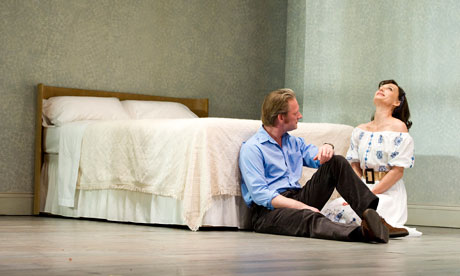
The opera-going former politician David Mellor has reportedly taken to remonstrating with members of the audience who insist on chattering in counterpoint to the sound from the stage. He seems to be upholding the old-fashioned view that the audience should behave like a religious congregation; in fact, even more so, having no bold-printed responses to shout out.
But, as in Putney in 1997, Mellor is fighting a losing battle. I spend much of each week sitting in audiences – theatrical, cinematic, operatic – and there has clearly been a sharp shift in the etiquette. Sometimes the most quiet and attentive patrons I encounter are to be found during my footballing afternoon off from the arts.
Mellor's concern about operatic chatting seems tame against what goes on in theatres these days. There reputedly is a couple who have sex in the stalls during West End performances, but last week I saw a play almost stopped by theatregoers at the other end of the relationship spectrum. During the first scene of a preview of the new revival of Harold Pinter's Betrayal, Kristin Scott Thomas and Douglas Henshall were drowned out by a theatregoer taking calls on a mobile who was not only answering loudly but clomping noisily out on each occasion, while shouting the odds with their partner. The actors seemed on the brink of walking off.
This is an extreme example, although, on the opening night of the musical Betty Blue Eyes, the cast had to compete with a young man vociferously complaining about the choice of show. But on an average night, portions of the performance are lost to the audience. Indeed, the Betrayal actors who had battled through the first scene then lost the beginning of the second because of the thunderingly disruptive admission of latecomers claiming seats.
Although mobiles now rarely ring more than twice in a performance, many ticket-holders regard it as acceptable manners to text or tweet their minute-by-minute reactions. During a recent evening at the RSC, a group of schoolchildren seemed to be texting each other. As a result, many playhouses have upgraded their mobiles announcement to include the caution that the "vibration and flashing of devices in silent mode" can also put off actors.
Movie actors, though they never know it, face even greater distraction. At my local multiplex, screenings frequently feature long exchanges of "Sshhh!" and more obscene replies between generations brought up to watch movies like David Mellor at an opera and those who like to discuss the action with each other.
It's common to blame TV for this new, audible way of seeing: used to commenting while the box is on, the viewer is then Darwinesquely driven to debate during similar forms of entertainment. But TV long predates the collapse of manners during live performance, so the culprit must surely be more recent changes in communication. Mobiles have removed the concept of ever being out of contact – if that vital email drops during the fifth act of Hamlet, so be it – while social networking is creating a group for whom the experience of seeing something is inseparable from sharing their response as quickly as possible.
There is, though, one gathering that can be relied on to be completely silent: the national critics' screening of a Hollywood comedy. The convention that reviewers don't audibly respond to the material on screen can be alarming to newcomers although, to be fair, the grim silence sometimes accurately anticipates the public response to the film. Theatre critics also often observe inscrutably, leading, on first nights, to an uneasy struggle with the bussed-in celebs and friends of cast and crew, who receive each line as if it's an announcement of the abolition of income tax.
Paying customers do not need to be as guarded in their reactions as a critic but, in general, they should take the advice given by another theatregoer to the couple at Betrayal: shut up or get out.

